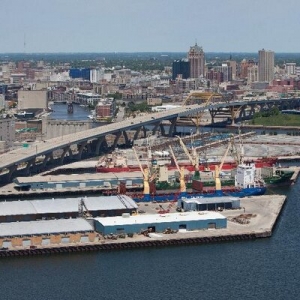


(Posted on 26/02/19)
Port Milwaukee posted significant gains in cargo movement through the St. Lawrence Seaway in 2018, an indication that international trade disputes have not, as yet, had a major impact on the amount of overseas cargo moving through the port.
Port Director Adam Schlicht presented the 2018 cargo report to the Board of Harbour Commissioners where he shared that Seaway cargo – including raw material for manufacturers and agricultural products – was up 28% when compared to the previous year.
Overall cargo numbers were down 8%, a decline driven largely by reduced quantities of salt arriving at Jones Island. A summer labour dispute at a major Canadian salt mine interrupted the stockpiling that typically occurs at Port Milwaukee.
“Salt volume was down by 18% last year, but during the first seven weeks of 2019, ships have delivered salt weekly to Milwaukee,” Director Schlicht said. ”Port Milwaukee has remained accessible to our shipping and rail customers through the coldest parts of winter, and we are optimistic that 2019 volumes will rebound, finishing ahead of last year.”
Among the commodities contributing to the port’s strong cargo numbers were cement, steel used in manufacturing, and Wisconsin-grown grain. The Port also saw increased use of its liquid cargo pier.
Port Milwaukee is an economic entity of City government governed by the seven-member Board of Harbour Commissioners, a panel appointed by Mayor Tom Barrett and confirmed by the Common Council. It administers operations on the 467 acres that make up the Port. It promotes shipping and commerce throughout the region by providing access to domestic and international ships, rail, and over-the-road transportation.
Port Milwaukee offers an operational flexibility unique to the western Great Lakes and the inland waterway system. Terminals designed for the efficient handling of dry and liquid bulk, general and project cargoes, roll on/ roll off, containers, and heavy lifts in excess of two hundred tons, provide vessel owners and cargo interests with safe, efficient and cost effective cargo handling services.
Port Milwaukee has devoted over 50 acres (20.24 hectares) to dry bulk storage and handling facilities, including four storage domes totalling 50,000 tons of storage. Much of the ground storage is paved. Additional acreage is available for dry bulk storage. Dry bulk handling services include storage and stock piling, direct transfer truck/rail/barge, vessel loading and unloading, packaging, palletizing and processing. Kinder Morgan is the Port's bulk stevedore and handles a wide variety of dry bulk materials including salt, construction aggregates, coal, and fertilizers.
The Port provides over 330,000 square feet of covered warehouse space for bulk, steel and general cargoes, including 30,000 square feet (2,800 square meters) of heated space. All facilities are steel frame buildings with brick/aluminum exteriors. All general cargo piers are paved with concrete and asphalt and each is rail served. Total general cargo facility exceeds 20 acres (8.1 hectares), plus additional backup storage as needed.
With this year’s Rail Conference “Rail Freight Transport and Seaports”, a joint initiative... Read more
Asian Bulk Logistics (ABL Group) and ICG have jointly announced the successful completion of ABL&rsquo... Read more
Abu Dhabi based AD Ports Group, a leading global enabler of integrated trade, industry and logistics... Read more
The Executive Board of Hamburger Hafen und Logistik AG (HHLA) has appointed Patrick Krawutschke as Managing... Read more
Abu Dhabi based AD Ports Group, a global enabler of integrated trade, transport, industry, and logistics... Read more
This year marks a significant milestone in maritime innovation as Port Hedland, Australia, celebrates... Read more
Associated British Ports (ABP), the UK’s leading port operator, has announced the latest tranche... Read more
During the Investment, Labour, and Trade Promotion Programme in Japan (November 16–22, 2025),... Read more
AD Ports Group subsidiary Khalifa Economic Zones Abu Dhabi - KEZAD Group, the largest operator of integrated... Read more
Abu Dhabi based AD Ports Group, a global enabler of integrated trade, transport, industry, and logistics... Read more